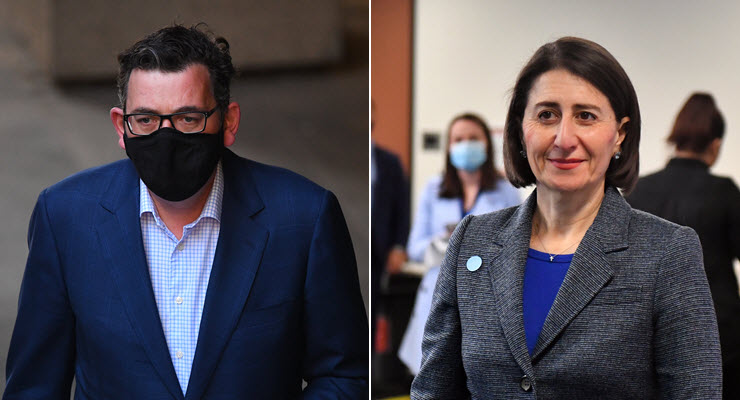
We were never meant to be in this mess. For most of 2021, in most of Australia, life was mostly normal. So normal we lost any sense of urgency about the vaccine rollout. Still, we assumed we’d figured out how to keep the virus at bay until enough of the population was vaccinated.
Then along came Delta, the beastly, fast-moving, more infectious variant. Delta is harder to stop because people who get it have higher viral loads sooner after being infectious. They shed more virus sooner, and are infectious for longer. That’s left us with a strain up to 60% more infectious than previous variants.
And once it got out into Australia’s largest cities, it was always going to leave governments and health authorities playing catch-up. Now half the country is in lockdown, and the Morrison government is scrambling. Within a matter of days, Delta has forced it to throw promises out the window. It’s rewriting the rules about good pandemic management in real time. And it leaves Australia facing a winter of discontent, where we’re even more divided and uncertain about how we manage the next phase of the pandemic.
The end of the gold standard?
Once hailed as the “gold standard” of pandemic management, New South Wales’ success has become a casualty of Delta.
Sure the “gold standard” stuff was annoying. But until a few weeks ago, by any reasonable objective metric NSW handled the pandemic better than Victoria. It reined in outbreaks without needing to put citizens into lockdown (including outbreaks that spread from Melbourne). Its fine-tuned “test, trace and isolate” system was so effective Victorian officials flew to Sydney to study it.
Far fewer people died in NSW. Far fewer lives were disrupted. By 2021 it seemed that while NSW recognised the terribleness of lockdowns, Victorian officials, chastened by moving too slowly last winter, were far more risk-averse, putting people into constant limbo. All this while taking more foreign arrivals than any other state.
Delta changed things. It outpaced the NSW contact tracers and seeded in working-class communities while they weren’t looking. When faced with a Delta outbreak, the light-touch approach failed to rein in cases, and failed to stop an indefinite lockdown. The state government is still being criticised for not locking down quickly enough.
Meanwhile, Victorian Premier Dan Andrews is adamant a highly restrictive five-day lockdown is the way to go. If Victoria snuffs out the outbreak, a risk-averse world of rolling short lockdowns will become standard across the country.
Still, Australian National University infectious diseases expert Peter Collignon questions the efficacy of continuous five-day lockdowns. He says five days implies contact tracers are behind the curve and need the time to catch up. If there are undetected cases in the community, you need seven or 14 days.
“I do think you have to restrict people’s movement as much as possible,” he said. “But what are we going to do for the next four to five months? Are we going to lockdown over one or two cases?”
The end of the new deal
Prime Minister Scott Morrison certainly didn’t want states locking down for a handful of cases. Just two weeks ago, national cabinet agreed lockdowns would be a last resort. That does not seem to be the case in Victoria. That decision was part of the first phase of Morrison’s vague, four-phase new deal for Australia, which hinted at a plan for a post-pandemic future. Now phase one has already broken down.
“They should be a last resort but sometimes, with the Delta variant, you come to that position a lot more quickly than you used to,” Morrison said yesterday.
“Australians understand that dealing with COVID-19 doesn’t come with a rule book. And as much as we’d like the certainty that affects so many other areas of things that we have to deal with, that doesn’t apply with this.”
Delta has completely shredded Morrison’s rule book, and makes it seem like the government is making it all up on the fly. In early June, it reluctantly put together an income support package that would kick in when a state entered its second week of lockdown — after an outbreak in Victoria. As the Sydney lockdown extended, it slowly changed the rules to make support more generous, to the fury of the Victorian government. When Victoria entered lockdown last night, it got federal income support immediately, the third change to the rules in six weeks.
The government is resigned to a future in which lockdowns continue, despite assuming they wouldn’t in its May budget. Such is the destructive power of Delta. Coupled with a slow vaccine rollout, it’s consigned Australia to a year that looks a lot like the last.








Crikey is committed to hosting lively discussions. Help us keep the conversation useful, interesting and welcoming. We aim to publish comments quickly in the interest of promoting robust conversation, but we’re a small team and we deploy filters to protect against legal risk. Occasionally your comment may be held up while we review, but we’re working as fast as we can to keep the conversation rolling.
The Crikey comment section is members-only content. Please subscribe to leave a comment.
The Crikey comment section is members-only content. Please login to leave a comment.